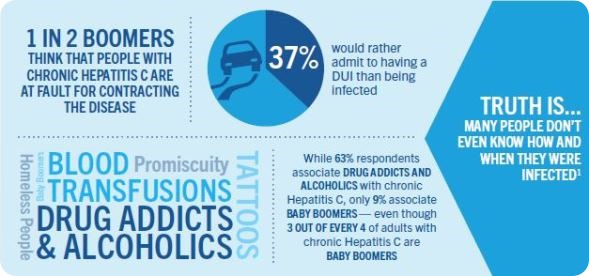The USPSTF agreed with the CDC that since most patients (75%) who are currently infected with hepatitis C were born between 1945 - 1965, and since risk-based screening has not been successful in identifying these individuals, that a one time age-based hepatitis C blood test was necessary.
Baby boomers were caught in a difficult time: an increased intravenous drug experimentation in the 1960s and 1970s, coupled with an inability to effectively screen blood products for hepatitis C until 1992, led to a disproportionate number of infected individuals.

Is it possible to live with HCV without having any symptoms?
Yes, the most common symptom of chronic hepatitis is fatigue, which is very common in many uninfected individuals as well.

What are the dangers of living with HCV?
The concern with chronic hepatitis C is the potential to progress to cirrhosis, liver cancer and need for liver transplantation. Death from cirrhosis (of which hepatitis C is a major cause) is now the 8th leading cause of death in America.

How many people are estimated to be unaware that they have HCV?
The CDC estimates that as many as 50% of infected individuals are currently unaware of their infection.

What does a HCV test involve?
It is a simple blood test which detects the antibody to the hepatitis C virus.
Is it possible to treat HCV?
Yes. We have had treatments for hepatitis C since the early 1990s, but these treatments have been rapidly undergoing significant changes in recent years.
Current hepatitis C therapy can cure about 75% of those treated, but the treatment is lengthy and difficult.
Newer therapies which should be available in early 2014 promise even better cure rates (85-95%) with as little as 12 weeks of treatment.

Is it necessary for people born outside 1945-1965 to get tested for HCV?
Others with any risk factors for hepatitis C also need testing. These include:
-
Current or former injection drug users, including those who injected only once many years ago
-
Recipients of clotting factor concentrates made before 1987, when more advanced methods for manufacturing those products were developed
-
Recipients of blood transfusions or solid organ transplants before July 1992, when better testing of blood donors became available
-
Chronic hemodialysis patients
-
Persons with known exposures to HCV, such as
-
health care workers after needlesticks involving HCV-positive blood
-
recipients of blood or organs from a donor who tested HCV-positive
-
Persons with HIV infection
-
Children born to HCV-positive mothers

How do you think the future of HCV testing and treatment will progress?
We are at a unique moment in time when baby boomer screening may uncover 800,000 new cases of hepatitis C at a time when treatment for hepatitis C is becoming easier, safer and highly effective.
We have the potential to significantly diminish the healthcare consequences and long term costs of hepatitis C within the next few years.
Where can readers find more information?
About Dr. Donald Jensen
 Dr. Donald Jensen is an expert in the diagnosis and management of liver diseases, particularly hepatitis C. He has extensive experience in the evaluation and treatment of viral hepatitis, autoimmune hepatitis, and fatty liver syndromes, among others.
Dr. Donald Jensen is an expert in the diagnosis and management of liver diseases, particularly hepatitis C. He has extensive experience in the evaluation and treatment of viral hepatitis, autoimmune hepatitis, and fatty liver syndromes, among others.
Dr. Jensen's research includes the evaluation of new and emerging therapies for chronic viral hepatitis, particularly hepatitis C.
He is an editor for several medical journals and a contributor to over 200 publications, abstracts and book chapters.
Dr. Jensen is also an invited lecturer for numerous presentations on topics in viral hepatitis, cirrhosis and liver transplantation. He is regularly featured in lists of America's best doctors.
Infographic references
1. “Hepatitis C: Proposed Expansion of Testing Recommendations, 2012,” U.S. Department of Health and Human Services; Centers for Disease Control and
Prevention, published May 2012. P 1, 2
The Genentech, Inc. survey was conducted by Wakefield Research among 400 baby boomers in each of the following cities: Miami, Philadelphia and Washington, D.C.
The online survey was conducted between May 31 and June 10, 2013, using an email invitation.
www.gene.com
Assembled by Genentech, a member of the Roche Group. ©Copyright 2013 Genentech USA, Inc. All rights reserved.